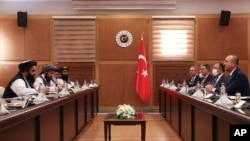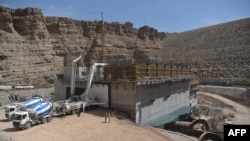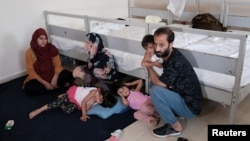While many countries cut diplomatic ties with Afghanistan after the Taliban's return to power last year, Turkey, the only NATO member with a diplomatic presence in the war-torn country, has been active on many fronts.
Recently, the second phase of the Kajaki hydroelectric dam in Helmand province was completed by the Turkish company 77 Construction, which has invested $160 million in the project.
Several senior Taliban officials attended the opening ceremonies for the dam, including Abdul Ghani Baradar and Abdul Salam Hanafi, acting deputy prime ministers of the Taliban government. Turkey's ambassador in Kabul, Cihad Erginay, also was present.
“Although the Kajaki dam is an important investment in economic relations between our country and Afghanistan, our relations are more diverse and deeper,” Erginay said during the ceremony, adding that total trade volume between the countries increased 23% in the first six months of 2022.
'Positive legacy'
Some experts think that Turkey’s engagement with Afghanistan derives from the countries' shared diplomatic legacy, which dates back to modern Turkey’s founder Mustafa Kemal Ataturk and Afghanistan’s modernist king Amanullah Khan in the 1920s.
“That positive legacy has throughout all these years never been interrupted,” Alper Coskun, a senior fellow at the Carnegie Endowment for International Peace, told VOA.
From 2001 until the Taliban returned to power in August 2021, Turkey had taken part in NATO-led forces in Afghanistan.
"Turkey took a very deliberate position in ensuring that Turkish forces were not involved in [active warfare or lethal force] against the Afghan population in any way whatsoever,” Coskun said. “That, I believe, is something that the current regime in Afghanistan, the Taliban, are also cognizant of.”
Turkey withdrew its troops from Afghanistan before the Taliban’s August 2021 deadline for foreign forces to leave the country.
Kabul airport
According to Turkey's Defense Ministry, one of the Turkish soldiers' final assignments in Afghanistan was to provide “operational and force protection services" in Kabul at what was then known as the Hamid Karzai International Airport, since renamed the Kabul Airport.
Senior Turkish authorities have repeatedly shown interest in running the airport.
Last August, U.S. State Department spokesperson Ned Price said that “a secure, operational airport we feel is integral to our ability to have a functioning diplomatic presence on the ground. So, the safety, the security, the continuing operation of that airport — it is of high importance to us.”
“We are grateful that our Turkish partners have indicated a willingness to play a role in protecting that,” Price added.
Turkish President Recep Tayyip Erdogan said during a NATO summit in Madrid in June that Turkey had offered to operate the airport with Qatar and the United Arab Emirates but was awaiting the group’s response.
On July 7, however, Reuters quoted sources familiar with the negotiations saying the Taliban was close to handing all airport operations to the United Arab Emirates.
Some experts say Turkey's proposal was significant even though the bid fell through.
“It’s no small matter that Turkey was one of just a few countries in a position to be negotiating an accord to provide security at the Kabul Airport,” said Michael Kugelman, the deputy director of the Asia Program at the Wilson Center.
“That accord didn’t work out, but the fact that Turkey was even involved was significant, especially as the Taliban have made clear that they won’t allow any foreign security presence on their soil," he told VOA.
Recognition
Turkey has not formally recognized the Taliban, and Kugelman thinks that Turkey does not want to be the first to do so, considering “some reputational costs.”
On the other hand, Turkey hosted Amir Khan Muttaqi, the Taliban’s acting foreign minister, for high-level talks in October and the Antalya Diplomacy Forum, organized by the Turkish Foreign Ministry, in March.
On the sidelines of the forum, Thomas West, U.S. special representative for Afghanistan, met Muttaqi and Qatar’s Foreign Minister Sheikh Mohammed bin Abdulrahman Al Thani to talk about Washington’s Afghanistan policy.
West on Twitter thanked Turkey for hosting the event and said that “I look forward to discussions with important partners regarding international engagement with Afghanistan.”
Turkish Foreign Minister Mevlut Cavusoglu said after his meeting with Muttaqi, "We have told the international community about the importance of engagement with the Taliban administration. In fact, recognition and engagement are two different things.”
Turkey has advised the Taliban to form an inclusive government and ensure girls' education under its rule. Ankara has also repeatedly talked about the importance of stability in Afghanistan to prevent additional refugee flow into Turkey.
“Our country, which is currently hosting around 5 million foreigners — 3.6 million of whom have come from Syria — cannot shoulder a new migration burden originating from Afghanistan," Erdogan said at the G-20 meeting on Afghanistan in October.
According to figures from Turkey’s Presidency of Migration Management, Turkish authorities arrested around 70,000 irregular Afghan migrants in 2021.
Humanitarian aid
Speaking at the 15th annual summit of the Economic Cooperation Organization in November, Erdogan also said that the Afghan economy should be revitalized to prevent a refugee crisis, adding that Turkey supports “efforts aimed at keeping basic state structures, including critical sectors such as health care and education, functioning.”
Since the Taliban’s return to power a year ago, Turkey’s state-run Disaster and Emergency Management Authority has sent five charity trains with 5,570 tons of humanitarian aid to the war-torn country. The Turkish Red Crescent, which has been operating in Afghanistan, has delivered aid assistance to people affected by the 6.1 magnitude earthquake on June 22.
Active in Afghanistan since 2005 and with offices in Kabul, Herat and Mazar-e-Sharif, Turkey’s state-run Turkish Cooperation and Coordination Agency has recently delivered 2,000 aid kits to help malnourished Afghan children.
Turkey also exerts soft power in Afghanistan via the Yunus Emre Institute, a cultural center owned by the Turkish government; Diyanet, the Turkish Directorate of Religious Affairs; and at least 46 Afghan-Turk Maarif Schools in seven provinces.
Twelve of these schools had been owned by the Gulen movement, a group Turkey blames for a failed coup attempt in 2016, but the Afghan government transferred the schools to the Turkish government’s Maarif Foundation in 2018.
Azarakhsh Hafizi, former head of the international relations committee at Afghanistan's Chamber of Commerce and Industries, calls the Turkey-run schools “near to international standards,” adding, "The youth of Afghanistan need these services.”
Some analysts say, however, that one of the reasons Ankara has active public diplomacy in Afghanistan is because it wants to boost its domestic popularity.
“Ankara likes to see itself as a world player, and so having its foundations and education apparatuses participating in Afghanistan is a good ... domestic political checkmark to show that it has an active foreign policy,” said Aaron Stein, director of research at the Foreign Policy Research Institute.
But Stein thinks Ankara’s Afghanistan policy does not resonate with the Turkish public.
“They care about the cost of living rather than foreign policy in that sense," he told VOA. "They are a lot like everybody else around the world, like, ‘Our cost of living is skyrocketing. Take care of that. We don't care about what's going on in Afghanistan.’”
This story originated in VOA’s Turkish Service.







